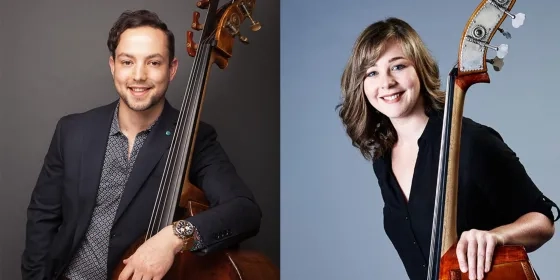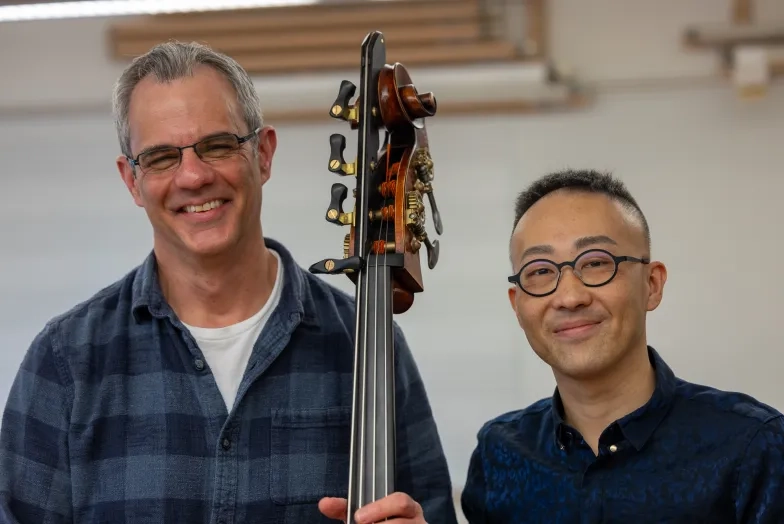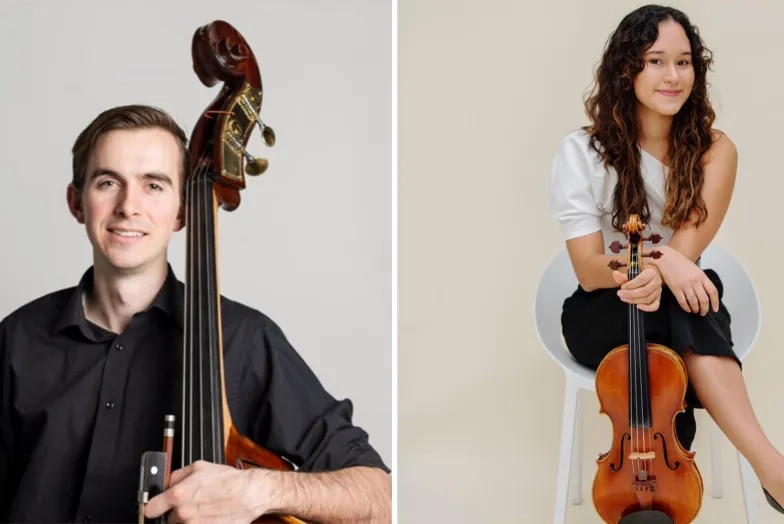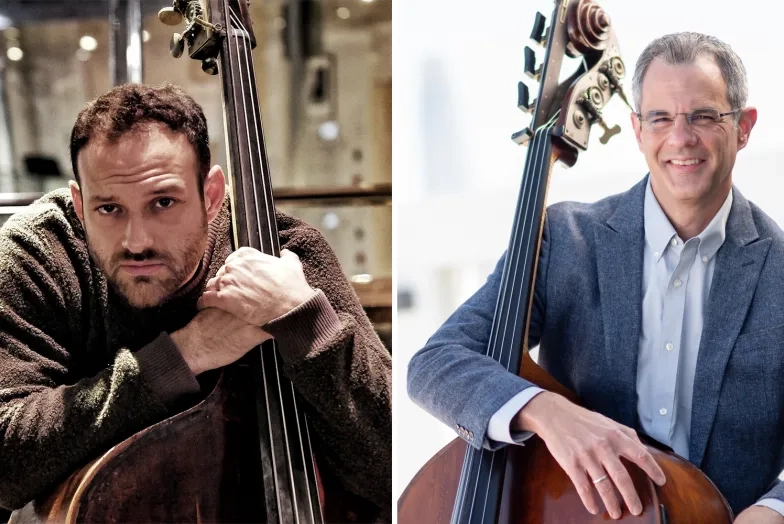Double Bass Alumni Win Orchestral Positions Locally and Abroad
Of all the instruments in an orchestra, how does one choose to play perhaps the biggest one? SFCM graduates Robert Ashley ’10, Marco Behtash ’12, Alanna Jones ’13, and Michael Minor ’18 know what it feels like to lug around a double bass from rehearsals, to concerts, to more rehearsals. They also know what it feels like to fall in love with playing this instrument. Today, all four have successful orchestral careers all over the world.
Although their stories vary, their journeys converge on a couple of things: the unexpected and all-consuming love of playing the bass and SFCM.
Robert Ashley, Principal Bass, Marin Symphony; Faculty, University of California, Santa Cruz
Robert Ashley started on violin, switched to cello, and then, in the fifth grade, it happened: “I saw another student playing electric bass, and I was captivated.”
“By the time I finished eighth grade, I knew it was what I wanted to do for a living,” says Ashley. “I was playing bass almost six to eight hours a day. I spent two amazing summers at Boston University's Tanglewood Institute, which ultimately inspired me to pursue classical music instead of jazz, and I haven't looked back since.”
At SFCM, Ashley studied with bass faculty and principal bass of the San Francisco Symphony Scott Pingel. “My lessons with him were unlike anything else I had experienced up until that point,” says Ashley. “He knew exactly how and why he did everything that he did, and perhaps more importantly, he was able to walk me through step by step. I really treasure my time spent at SFCM.”
Ashley describes Pingel’s methodical instruction covering every facet of playing the bass, from string crossings to breathing techniques, remarking, “I left the Conservatory armed with a suite of practice techniques that have served me extremely well.”
Today, Ashley is principal bass of the Marin Symphony and bass faculty at the University of California, Santa Cruz. “My favorite thing is the moment in a concert when I cue a pizzicato and I can feel the whole section paying close attention. The feeling is awesome when everyone releases the string at the same moment with the same timbre and that massive wavefront moves through the orchestra. It’s addictive.”
At Santa Cruz, Ashley finds teaching hugely satisfying. “It’s rewarding to pass on all of the insights I have gathered from my mentors and to see them bear fruit for the students,” he says. “And the act of teaching has the wonderful benefit of forcing you to clarify your own technical and musical abstractions into something more concrete and easily understood. This benefits the teacher almost as much as the student.”
Marco Behtash, Sub-Principal Bass, Royal Opera House, Covent Garden (London, England)
“I chose the bass simply for its size and deep sound,” says Marco Behtash. “Both were very attractive to me and still are in exactly the same way. The idea for a career in music never crossed my mind until my senior year in high school when I played in orchestra for the first time. I had never played the bass in any ensemble until I joined the San Francisco Symphony Youth Orchestra that season, and it totally changed my life and was with no doubt the turning point.”
With the encouragement of his music teachers, Behtash decided to pursue a career in orchestral playing. “I thought, ‘You only live once. If I don’t try this music thing now, I will wonder what could have been for the rest of my life.’”
Behtash came to SFCM having already participated in the Conservatory’s Pre-College years earlier. “I started with Shinji Eshima, a bassist in the San Francisco Opera Orchestra. He was the perfect first teacher, offering just the right mix of encouragement, challenges, rewards, and a fantastic foundation for a beginner on the bass.”
Later, Pingel helped him prepare for an orchestral career. “I feel confident everywhere on the bass and I know I can play anything that is thrown at me because I know how to break it down to make it learnable,” he says. “I’m thankful every day for the all-around bulletproof foundation Scott gave me.”
Now a bassist at the Royal Opera House in London, Behtash plays for both ballet and opera productions. “It’s a privilege to play masterpieces like Tchaikovsky's Swan Lake or Sleeping Beauty, Prokofiev's Romeo and Juliet, Stravinsky's Firebird, Rite of Spring, or Petrushka in their original, intended settings.”
Behtash is also invited to play with the London Symphony Orchestra several times a season. “It’s a nice way to get out of the pit, play in another legendary orchestra, and enjoy some symphonic repertoire.”
Alanna Jones, Section Bass, New Zealand Symphony Orchestra
For Alanna Jones, the love for playing the bass was especially unexpected. She grew up playing piano and harp, but her in senior year, she was asked to fill in on bass in her high school orchestra. “I enjoyed playing bass,” she recalls, “but it wasn’t until I participated in the Auckland Philharmonia Orchestral Summer School that I really knew I wanted to be an orchestral bassist.”
Jones relished her time at SFCM, and cites Western Civilization, taught by Chair of the Humanities and Sciences Nikolaus Hohmann, as a pivotal class in her education. “Dr. Hohmann is one of the best lecturers I’ve ever had. Even though the lectures were at 8 AM, I miss them.”
Of course, Jones spent most of her time focusing on the bass. “I studied with Scott Pingel, and now that I am teaching, I find myself revisiting so many things that he taught me. I teach spiccato the way Scott taught me, and I always strive to exercise the same level of curiosity he did.”
In 2019, after two years participating in the Sydney Symphony Fellowship Program, Jones will begin playing with the New Zealand Symphony Orchestra. “I have fallen in love with Sydney, but I am thrilled to be moving back to my home country. The New Zealand Symphony happens to be very friendly, and I am looking forward to being a part of such a great band.”
Before she heads over to New Zealand, Jones will embark on a tour of Europe with the Sydney Symphony where they will perform three of her favorite works: Mahler’s Symphony No. 5, Beethoven’s Symphony No. 7, and Prokofiev’s Symphony No. 5.
Michael Minor, Bass, Philharmonia Baroque Orchestra, San Francisco
For Michael Minor, playing the bass began as a joke on his parents. “I really wanted to play cello, but my parents thought the instrument was too big and told me to play viola or violin,” he recalls. “I never imagined that I would be playing for very long, so as a joke, I decided I would choose upright bass because they never told me I couldn’t play it.”
But, as fate would have it, he quickly fell in love. “By the eighth grade, I knew I wanted to be a professional musician.”
At SFCM, Minor studied with Eshima and later with Pingel. “Each and every day I continue to learn and grow from what they taught me. Shinji Eshima helped me hone my craft and shed some of my bad habits. Scott helped me refine my technique and overcome injuries while I was studying.”
Minor is currently a member of the Philharmonia Baroque orchestra, a job which he describes as nothing short of a dream. “I am constantly learning from my colleagues and am lucky to share the stage with such wonderful artists. The detail and sensitivity that they exhibit is awe-inspiring and has changed the way that I play and rehearse.”
Common Roots: SFCM
A common current throughout all these stories is bass faculty Scott Pingel. “There is nothing more rewarding to me than when I’m able to assist someone in achieving greater joy and beauty in playing music,” he says.
In addition to these students, former SFCM bass student Owen Levine ’07 is now a member of the Colorado Symphony and Tian Yang Liu ’13 won first prize at the International Society of Bassists Solo Competition. The bass studio is, by all accounts, thriving.
Furthermore, Pingel is dedicated to helping his students foster their own artistic point of view⎯a skill fundamental to becoming a successful musician.
“SFCM is unique for a number of reasons,” he continues. “I like to keep my studio small so that each student can get highly personalized individual instruction that fits their needs and goals. Another reason is that the school is only one block from the San Francisco Symphony, Opera, Ballet, SFJAZZ Center, and so much more that contributes to the cultural enrichment of the students outside of school.”
But even considering the opportunities an SFCM education provides, Marco Behtash notes Pingel’s continuous presence as the overwhelming factor that inspires and leads him to this day.
“It’s vital to know how to teach yourself once in the profession, and Scott gave me the tools to do just that.”



